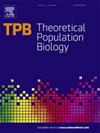基因-文化关联与共同进化
IF 1.3
4区 生物学
Q4 ECOLOGY
引用次数: 0
摘要
文化物种的遗传进化可以通过其基因与其文化性状的动态相互作用而改变。在人类中,基因-文化相互作用的例子是常见的,对基因-文化共同进化的更深入的理论理解是认识文化对人类进化影响的必要前提。尽管有大量关于基因-文化共同进化现象的实证研究和大量的语言理论,但我们对基因-文化共同进化的理论理解,哪些文化特征是相关的,以及文化与基因相互作用的定量性质仍然不完整。提出了文化传播偏差、生存力选择和遗传进化三者之间相互作用的两种基因-文化协同进化模型。我们表明,基因-文化共同进化可以在没有文化特征选择的情况下发生,一些参数可以导致所有遗传和文化类型都是多态的内部平衡,基因-文化关联可以保持,基因-文化共同进化系统具有丰富和意想不到的动态。本文章由计算机程序翻译,如有差异,请以英文原文为准。
Gene-culture association and coevolution
The genetic evolution of cultural species can be altered by the dynamic interaction of their genes with their cultural traits. In humans, examples of gene-culture interactions are common and a deeper theoretical understanding of gene-culture coevolution is a necessary precursor to recognizing the effects of culture on human evolution. Although there are a large number of empirical studies of gene-culture coevolutionary phenomena and a large amount of verbal theory, our theoretical understanding of gene-culture co-evolution, of what kinds of cultural traits are relevant, and of the quantitative nature of cultural interactions with genes remains incomplete. Two models of gene-culture coevolution in which there are interactions between cultural transmission biases, viability selection, and genetic evolution are presented. We show that gene-culture coevolution can occur in the absence of selection on the cultural trait, that some parameters can lead to internal equilibria in which all genetic and cultural types are polymorphic, that gene-culture association may be maintained, and that gene-culture coevolutionary systems have rich and unexpected dynamics.
求助全文
通过发布文献求助,成功后即可免费获取论文全文。
去求助
来源期刊

Theoretical Population Biology
生物-进化生物学
CiteScore
2.50
自引率
14.30%
发文量
43
审稿时长
6-12 weeks
期刊介绍:
An interdisciplinary journal, Theoretical Population Biology presents articles on theoretical aspects of the biology of populations, particularly in the areas of demography, ecology, epidemiology, evolution, and genetics. Emphasis is on the development of mathematical theory and models that enhance the understanding of biological phenomena.
Articles highlight the motivation and significance of the work for advancing progress in biology, relying on a substantial mathematical effort to obtain biological insight. The journal also presents empirical results and computational and statistical methods directly impinging on theoretical problems in population biology.
 求助内容:
求助内容: 应助结果提醒方式:
应助结果提醒方式:


